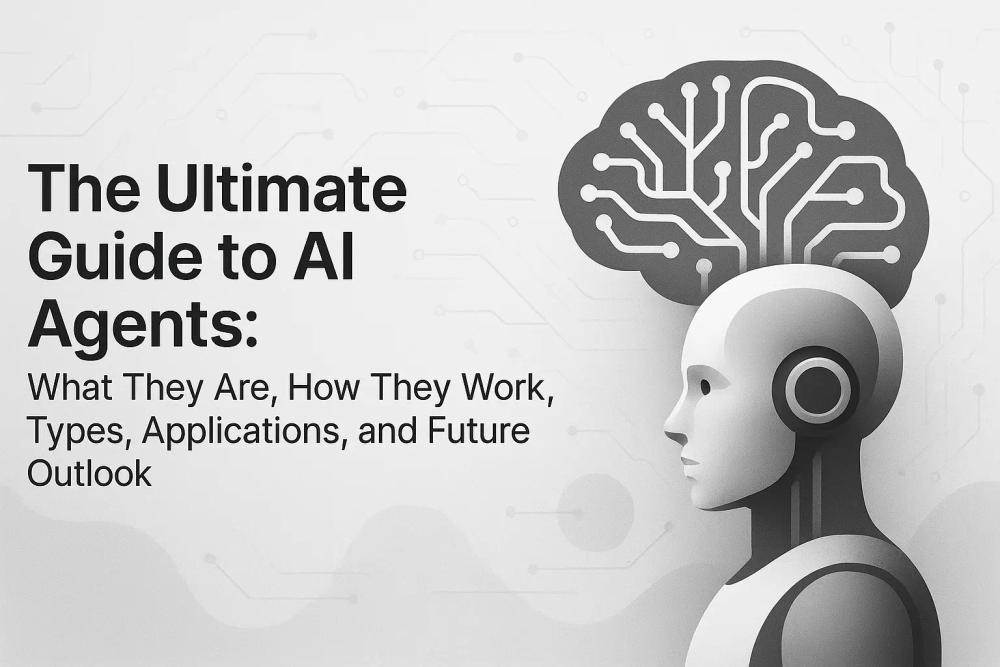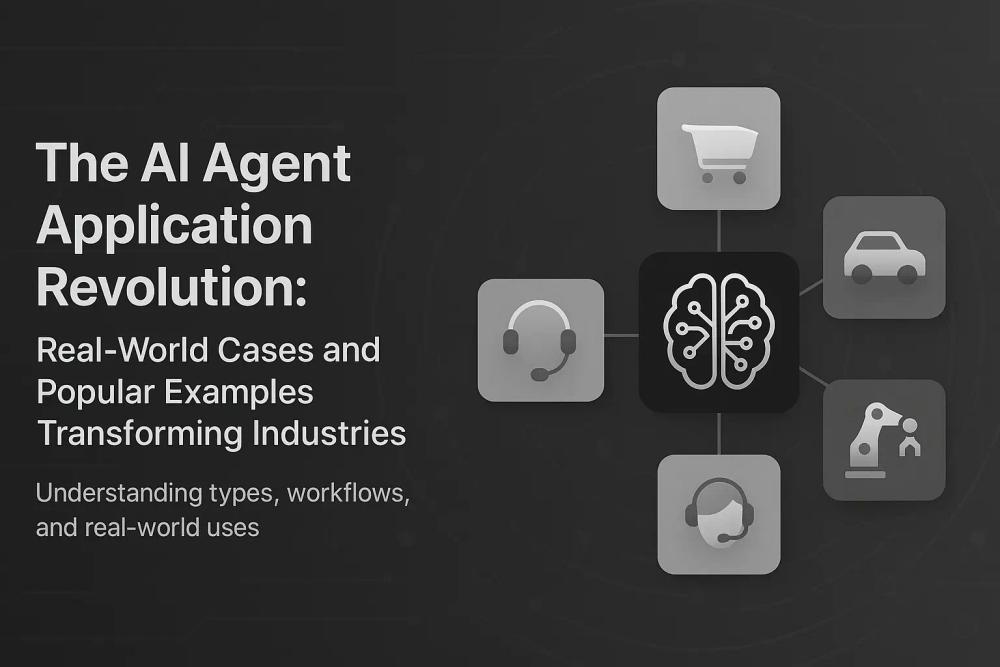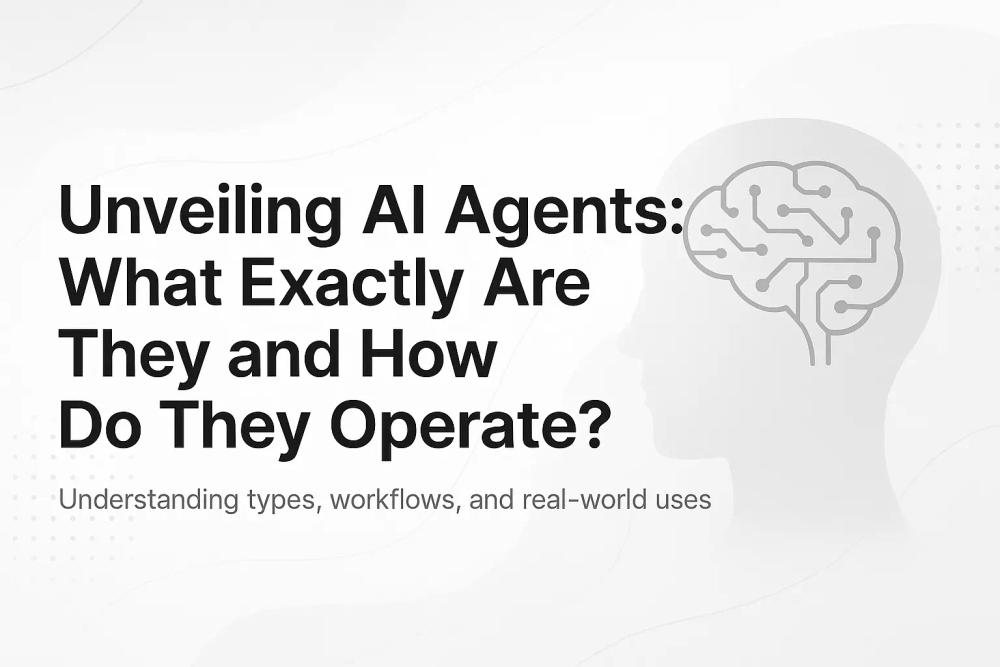
From the helpful chatbot that instantly solves your problem to the smart algorithm that suggests your next favorite movie, AI Agents are the invisible engines powering much of our digital world. They are no longer just concepts in a lab; they are here, now, making our lives easier and our businesses smarter.
In our last guide, we met the "cast of characters"—the different types of AI Agents, from simple rule-followers to adaptive learners. But where do these agents actually live and work? What real-world jobs do they have?
This is where theory meets reality. We're about to pull back the curtain on the most impactful AI Agents examples across key industries. You'll see how the conversational AI agent is transforming customer service, and how other agents are revolutionizing everything from healthcare to how you shop online. You might be surprised to discover just how deeply they are already a part of your life.
1. AI Agents in Customer Service: The Rise of Intelligent Support
The customer service landscape has been profoundly impacted by AI Agents in customer service. Conversational AI agents, intelligent virtual agents (IVAs), and AI virtual agents are now commonplace, offering support through various channels.
- Chatbots & Virtual Assistants: These agents handle a vast range of customer inquiries, from simple FAQs to more complex troubleshooting. They can provide 24/7 support, drastically reducing wait times and freeing up human agents for more intricate issues.
- Personalized Interactions: AI agents can access customer data to provide personalized responses and recommendations, enhancing user satisfaction.
- Automated Ticketing & Routing: Agents can automatically categorize support tickets and route them to the appropriate human agent or department if necessary.
Benefits:
- Increased efficiency and scalability.
- Reduced operational costs.
- Improved customer satisfaction through instant responses.
- Consistent service quality.
These conversational AI Agents applications are continuously evolving, becoming more human-like and capable.

2. AI Agents for Marketing Automation: Personalization at Scale
AI Agents for marketing automation are empowering businesses to deliver highly personalized and effective marketing campaigns.
- Personalized Recommendations: AI algorithms analyze customer behavior, purchase history, and preferences to offer tailored product or content recommendations (think Netflix or Amazon).
- Targeted Advertising: Agents can optimize ad spend by identifying the most receptive audiences and dynamically adjusting campaigns based on performance.
- Automated Email Campaigns & Content Curation: AI can help craft personalized email sequences, suggest relevant content for different customer segments, and even generate marketing copy.
- Social Media Management: Some AI tools can schedule posts, analyze engagement, and identify trending topics relevant to a brand.
Benefits:
- Improved customer engagement and conversion rates.
- More efficient use of marketing budgets.
- Deeper insights into customer behavior.

3. AI Agents for Software Development: Coding Companions
The field of software engineering is also seeing significant contributions from AI Agents for software development.
- AI-Powered Code Completion & Generation: Tools like GitHub Copilot act as AI pair programmers, suggesting code snippets or even entire functions based on context and natural language descriptions.
- Automated Testing: AI agents can generate test cases, execute tests, and identify bugs more efficiently than traditional methods.
- Bug Detection and Fixing: Some advanced agents can analyze code for potential bugs and even suggest or implement fixes.
- Project Management Assistance: AI can help in optimizing development workflows, predicting project timelines, and allocating resources.
Benefits:
- Increased developer productivity.
- Faster development cycles.
- Improved code quality and fewer bugs.

4. Healthcare Applications of AI Agents: Enhancing Patient Care
The healthcare applications of AI Agents are vast and potentially life-saving, assisting medical professionals and improving patient outcomes.
- Diagnostic Support: AI agents can analyze medical images (X-rays, MRIs, CT scans) to detect anomalies like tumors or fractures, often with high accuracy, acting as a second opinion for radiologists.
- Personalized Treatment Plans: By analyzing patient data, genetic information, and medical literature, AI can help doctors devise customized treatment strategies.
- Drug Discovery and Development: AI accelerates the process of identifying potential drug candidates and predicting their efficacy.
- Robotic Surgery Assistants: AI-powered robotic systems can assist surgeons with greater precision and control in minimally invasive procedures.
- Virtual Health Assistants: AI chatbots can provide patients with medical information, remind them to take medication, and monitor symptoms.
Benefits:
- Earlier and more accurate diagnoses.
- More effective and personalized treatments.
- Reduced healthcare costs and improved efficiency.

5. AI Agents in E-commerce: Revolutionizing Online Retail
AI Agents in e-commerce are crucial for creating personalized shopping experiences and optimizing operations.
- Intelligent Product Recommendations: Sophisticated algorithms suggest products based on Browse history, purchase patterns, and similarities with other users.
- Personalized Shopping Experiences: AI can customize website layouts, offers, and content for individual users.
- Dynamic Pricing: Agents can adjust prices in real-time based on demand, competitor pricing, and inventory levels.
- Fraud Detection: AI algorithms are adept at identifying and flagging suspicious transactions.
- Inventory Management & Supply Chain Optimization: AI can predict demand, optimize stock levels, and streamline logistics.
- Virtual Shopping Assistants: Chatbots guide users through product selection, answer queries, and assist with the checkout process.
Benefits:
- Increased sales and customer loyalty.
- Optimized pricing and inventory.
- Enhanced security and operational efficiency.

6. AI Agents in Financial Services (FinTech): Securing and Optimizing Finance
The financial sector heavily relies on AI agents for security, efficiency, and customer service.
- Fraud Detection and Prevention: AI algorithms analyze transaction patterns in real-time to detect and prevent fraudulent activities.
- Algorithmic Trading: AI agents execute trades at high speeds based on complex algorithms and market analysis.
- Robo-Advisors: Automated investment platforms provide financial advice and manage portfolios based on user goals and risk tolerance.
- Credit Scoring and Loan Underwriting: AI assesses creditworthiness more quickly and potentially more accurately by analyzing a wider range of data points.
- Customer Service Chatbots: Handling banking queries, providing account information, and guiding users through financial processes.
Benefits:
- Enhanced security and risk management.
- Increased efficiency in trading and operations.
- Greater accessibility to financial advice.

7. AI Agents in Other Notable Industries: A Widening Impact
The influence of AI agents extends to many other sectors:
- Real Estate: AI for real estate agents includes tools for property valuation, matching buyers with properties, virtual property tours, and AI leasing agent platforms that automate tenant communication and lease management.
- Travel & Hospitality: Virtual travel booking agent AI platforms help users plan trips, find deals, and book flights and accommodations with personalized suggestions.
- Manufacturing: Predictive maintenance for machinery, AI-powered quality control through image recognition, and optimization of supply chains and production schedules.
- Education: Personalized learning paths tailored to individual student needs, automated grading systems, and intelligent tutoring systems offering one-on-one support.
- Autonomous Vehicles: Self-driving cars and drones are prime agent example in AI, using complex sensor fusion and decision-making to navigate real-world environments. The autonomous AI Agents benefits here include increased safety and efficiency.

8. Spotlight on Famous AI Agent Examples: Assistants We Know
Many AI agents have become household names, demonstrating the practical application of these technologies:
- Apple's Siri, Amazon's Alexa, Google Assistant: These are widely used intelligent virtual agents on smartphones and smart speakers, capable of understanding natural language to perform tasks like setting reminders, answering questions, playing music, and controlling smart home devices.
- IBM Watson: While a broader AI platform, Watson has powered various specialized agents, including IBM Watson Voice Agent for customer service and solutions in healthcare for analyzing medical data and assisting in diagnostics.
- Industry-Specific Chatbots: Many companies deploy specialized chatbots (e.g., banking bots, retail bots) that are highly effective task-oriented AI Agents examples.
These famous examples highlight how AI agents can simplify daily tasks and provide valuable assistance.

9. Deep Dive: Conversational AI Agents and Intelligent Virtual Assistants
The terms conversational AI agent, intelligent virtual agent (IVA), and AI virtual agent are often used interchangeably and represent a significant area of AI application.
- Core Technologies: They rely heavily on:
- Natural Language Processing (NLP): To understand the structure and meaning of human language.
- Natural Language Understanding (NLU): To grasp the intent behind user queries.
- Dialogue Management: To maintain context and manage the flow of conversation.
- Natural Language Generation (NLG): To produce human-like responses.
- Evolution: Early chatbots were rule-based and limited. Modern IVAs leverage machine learning and deep learning to understand context, handle complex queries, learn from interactions, and provide more personalized and empathetic responses.
- Applications: Beyond customer service, they are used for employee support, virtual coaching, information retrieval, and controlling applications through voice or text. Many task-oriented AI Agents examples, like booking appointments or ordering food, fall under this category.

Conclusion: The Ubiquitous Future of AI Agents
The AI Agents examples presented here offer just a glimpse into their rapidly expanding role across nearly every facet of modern life and industry. From automating routine tasks to solving complex problems and providing personalized experiences, AI agents are not just a futuristic concept but a present-day reality driving innovation and efficiency.
As these technologies continue to mature, we can expect even more sophisticated and integrated AI agent applications to emerge, further transforming how we work, live, and interact with the digital world.














